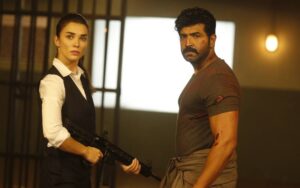Review: Aan Devathai
Cast: Samudrakani, Ramya Pandian, Hareesh Peradi, Suja Varunee, Radha Ravi and others; Director:Thamira ; Music: Ghibran
Cinematography: Vijay Milton

Film: Aan Devathai
Cast: Samudrakani, Ramya Pandian, Hareesh Peradi, Suja Varunee, Radha Ravi and others
Director:Thamira
Music: Ghibran
Cinematography: Vijay Milton
Every film that director Samuthirakani has been a part of, be it as an actor or as a director has had a strong story. Aan Devathai too is no exception
Thamira has directed this film, which has Samuthirakani playing the lead along with Ramya Pandian, the girl who stole our hearts in the National Award winning hit film, Joker.
The film is inspired by the hit Hollywood film, The Pursuit of Happyness.
Elango(Samuthirakani) is a self-respecting hardworking man, who is particular about fulfilling his duties as a parent. His wife Jesse(Ramya Pandian) is an ambitious, egoistic modern-day woman, who is more worried about her career and living her dreams rather than her family, comprising of her husband and their two young children.
While Elango works as a medical representative, Jesse works in the IT industry. Like most modern day couples, the two lead a hectic lifestyle, working all day, by leaving the kids either at day care or at school.
At one point, Elango, who has got his priorities right, realises that something is seriously wrong with their lifestyle. He finds out that as a result of both partners working, the children are being left unattended.
He points this out to Jesse saying that one of them must stay back to look after the children as they are at a very vulnerable age and that they need the care and affection of one of the parents consistently. He points out that they will be able to manage with one person working, if they cut down on unnecessary expenses.
Jesse is today’s modern day woman and has no qualms telling him that she cannot let go of her career and living her dreams. She makes sure she points out to her husband like most other women that she earns more than him. In fact, she rubs it in saying she can earn in a few months what he earns over a period of two years. Elango gets the message and offers to quit his job and look after the children.
He does a great job and the children’s lives improve substantially. Meanwhile, Jesse’s love for growth and her urge to get to the top of her professional ladder make her opt for a lifestyle that is beyond the couple’s means.
Despite Elango’s repeated warnings, she continues to borrow. First to buy a big apartment and then a costly car.
Meanwhile, Elango is mocked by everybody in the locality for being a ‘House Husband.’ He takes it in his stride and focuses on his objective of looking after the children.
Things continue like this for a while until the day, Jesse shows Elango who is the boss. She points out that Elango will be out begging on the streets for a morsel if it were not for her. That is the last straw. Elango’s priorities change. From keeping children’s interests ahead of everything else, he decides it is time to accord importance to his self-respect. Almost, the next instant, he decides to leave Jesse’s posh apartment to live his life on his own…
Aan Devathai is a fantastic film that captures reality as it is. It showcases what is happening in today’s world. It highlights how women, who are drunk on the power that financial independence provides them, use it as a means of claiming superiority over their spouses. In the process, families get destroyed and children are forced to suffer.
Samuthirakani and Ramya Pandian both come up with excellent performances as Elango and Jesse in the film. Cinematography is by Vijay Milton, who, as usual, does a great job with the camera. Ghibran’s music for the songs is just about okay but his background score is really apt.
Director Thamira seems to have made a slow-moving, but sensible film which deserves praise. The only problem with the story is a particular sequence in the film, where a senior citizen (played by Radha Ravi) counsels Elango on the need to get back with his wife. He tells Elango that he understands that it is Jesse’s mistake that has made Elango leave her. However, he says Elango should apologise to her and get back to living with her!! This regressive practice in Tamil cinema, of suggesting or making men apologise to women always, even when the fault lies entirely with the women, is unacceptable and has to be stopped.
Apart from this lapse, the film is by and large neat and sensible.







